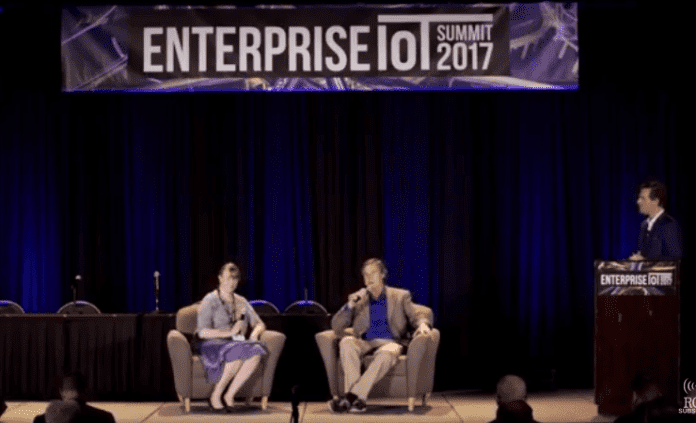Panel: The role of open source, standards and DevOps in connected Industries
Moderator Sean Kinney, Managing Editor at RCR Wireless News, is joined by Kate Stewart, Director of Strategic Accounts at The Linux Foundation and David Brenner, Wireless Marketing and Business Development at Intel Corporation to discuss open source, standards and DevOps in connected industries at the Enterprise IoT Summit in Austin, Texas.
Brenner kicks off the panel discussion highlight the fact that all the companies involved in the IoT space recognize the need for interoperability and the ability to deploy a standard for IoT that is based on standards and open-source software. “What we are actually doing is to partner with the Linux Foundation and we have developed full specifications for IoT device-to-device-capabilities”.
The executive also said that the Open Connectivity Foundation (OCF) and the Linux Foundation are currently working on a project dubbed IoTivity, which was created to bring together the open source community to accelerate the development of the framework and services required to connect billions of devices with IoT technology.
The IoTivity project is sponsored by the OCF, a group of industry leaders who will be developing a standard specification and certification program to address these challenges. IoTivity will deliver an open source reference implementation of the OCF standard specifications, yet will not be limited to those requirements.
Kate Steward explained that the Linux Foundation is currently working on over 50 projects. “The main goal of the Linux Foundation is to give people a neutral place to collaborate and come together on codes and standards to improve the ecosystem,” she said.
Steward also talked about the Zephyr Project, which is a Linux Foundation hosted Collaboration Project, an open source collaborative effort with the main aim of building a small, scalable, real-time operating system (RTOS) optimized for resource constrained devices, across multiple architectures. The Zephyr Project’s goal is to establish a neutral project where silicon vendors, OEMs, ODMs, ISVs, and OSVs can contribute technology to reduce the cost and accelerate time to market for developing the billions of devices that will make up the majority of the Internet of Things.
“We have started this project one year ago with three architectures and now we have six architectures in the Zephyr Project,” Stewart said. “We also started with six supported boards and now we have 23 boards so the project is starting to ramp-up quite nicely.”
Sean Kinney focuses on multiple subject areas including DAS, small cells, cloud computing, 5G and Internet of Things vertical applications. Sean also hosts RCRtv’s HetNet Happenings web show focused on physical infrastructure. Sean and wife Katherine live in Fayetteville, Arkansas. He studied journalism and literature at the University of Mississippi then spent six years based in Key West, Florida, working as a reporter for the Miami Herald Media Company.
Kate is a Senior Director of Strategic Programs at the Linux Foundation responsible a portfolio of open source projects and standards, which includes Zephyr Project. With almost 30 years of experience in the software industry, she has held a variety of roles and worked as a developer in Canada, Australia and the US. For the last 20 years has managed software development teams in the US, Canada, UK, India and China, and has been focused on delivery of open source based products from Freescale, Canonical & Linaro.
David Brenner is director of wireless solutions business development at Intel Corporation where he is involved with IoT standards and ecosystems. He is a communications technology leader with extensive industry experience from start-ups to Fortune 500 companies in engineering, marketing, sales, business development, product management, operations, customer service, and investment. With over 30 years of experience in communications and networking, Brenner has successfully led numerous teams through the changing business dynamic to meet the demands of today’s highly competitive technology environment. He has extensive experience driving communications industry standards including his work with the OCF, IEEE, IETF, Bluetooth SIG, Wi-Fi Alliance, WiMedia, USB-IF and others.
Brenner holds a Bachelor of Science degree in Electrical and Computer Engineering from Drexel University, and has partnered with universities on communications research and testing programs including the University of New Hampshire, Rice University and the University of Texas WNCG. He has published numerous business articles and technical papers as well as spoken at industry events including most recently for the Open Connectivity Foundation (OCF), where he serves as chairperson of the Liaison Group and Events Group as well as a key contributor to OCF marketing, ecosystem, strategy and membership efforts.

